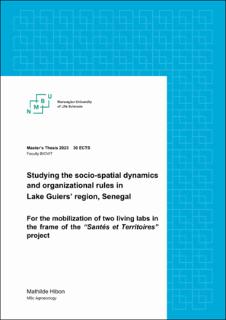| dc.description.abstract | In the context of a renewed dialogue on health and food security worldwide, Senegal aims to achieve food self-sufficiency by 2035, and the Lake Guiers’ region is at the core of its strategy. Agro-industrial and irrigation infrastructures have dramatically increased in the area and brought many issues to overcome. The “Santés et Territoires” project has recently launched two living labs around Lake Guiers to collectively address health issues based on the One Health concept and the agroecological transition. This work sought to disentangle the socio-spatial dynamics and identify the organizational rules at play in the area in order to better mobilize the living labs. After a first analysis of the state-of-the-art on the diversity and complexity of the socio-spatial reality in North Senegal, we performed 39 semi-structured interviews in the Lake Guiers’ region. We elaborated on two complementary frameworks to analyze the data: the TORSO model and the Institutional Grammar. The results reveal that there are direct and indirect interactions with the resources and among the diverse actors’ categories which nurture conflicting situations to access and use the resources. Those conflicting situations unravel relational patterns showing the role of customary laws on the territory. A focus on the main relational and organizational drivers around the Lake features 1) an institutional inertia and 2) a willingness to break away from it that creates discrepancies about the resources’ management. A crossed lecture of the two frameworks emphasizes the vertical, rigid, and detached position of institutions, the horizontal, practical and adaptative attitude of the communities and an in-between stand for external actors. The livings labs’ participants will have to aim for collaborative innovation and align on a shared vision to enhance territorial health.
Keywords: Living labs, One Health, agroecological transition, socio-spatial dynamics, organizational rules, Lake Guiers, Senegal | |
